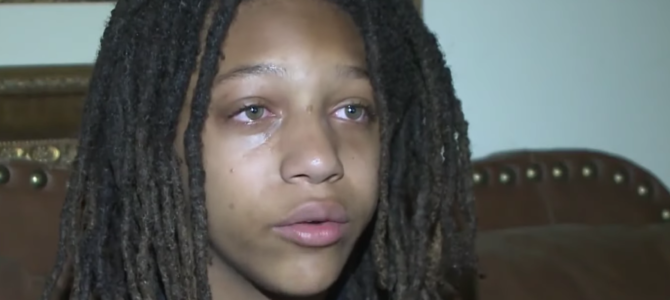
When a Catholic school girl accused three white boys in her class of cutting her dreadlocked hair, accusations of racism poured out. The girl went on TV, and national media picked up the story. The fact that Karen Pence, the wife of Vice President Mike Pence, teaches at the school added fuel to the fire, and publication after publication repeated that fact.
Everyone’s second-favorite congressional antisemite, Rep. Rashida Tlaib, offered words of encouragement to the girl: “You are beautiful. … You are courageous & strong. You are loved. You see … you may not feel it now, but you have a power that threatens their core. I can’t wait to watch you use it and thrive. Stay strong.”
You are beautiful, Amari Allen. You are courageous & strong. You are loved.
You see, Amari, you may not feel it now, but you have a power that threatens their core. I can't wait to watch you use it and thrive.
Stay strong. https://t.co/57rtAYby3h
— Rashida Tlaib (@RashidaTlaib) September 28, 2019
A few days later, the sixth-grader recanted the story, and her family publicly apologized to the boys and the school community.
The girl in question is just a sixth-grader, and sixth-graders make mistakes. It is a mark of our age, however, that a pre-teen girl would make mistakes politically. It has something to do with how the girls are, and how we raise girls.
Our mainstream culture now practically bathes children in leftist politics from the moment of birth. Not every parent tries to raise a genderless baby or invests in a library of “Baby Feminists” board books, but those who do find a reliable ally in the education establishment. Public education sneaks in with its kindergarten melanin projects, climate change homilies, and “Everyone Belongs Here” signs.
It’s not just schools that radiate politics. Recently published books can easily compete with the Soviet Union in amount of ideological content. Toys, too, are made increasingly dogmatic. Consider, for instance, the “gender-fluid” Barbie Mattel recently released. But why? Kids can imagine a stick to be gender fluid if they need to.
The older kids get, the more central to their education the propaganda becomes. It’s not just California public schools, apparently; the make-believe dreadlock trimming described above took place in a Catholic school where the very conservative second lady is a part-time teacher.
Girls are now aggressively primed for leadership — parents go ga-ga about leadership— with their “Future Leader” T-shirts and “positive role models” from “Frozen” and “Good Night Stories for Rebel Girls.”
Except political girls are no rebels. They obediently engage in performative activism. At one of the recent climate protests in D.C., an 11-year-old girl stood on the podium and talked about how she’s been “organizing” political actions since elementary school. The only reason she voiced such nonsense is because adults have encouraged it. In a time like ours when the political is encroaching in the personal, the way to please adults is, too frequently, to get political.
Girls are particularly good at pleasing. If boys don’t understand something, they typically go dig in the dirt. They are late bloomers, too. Girls tend to be more relational; they are pleasers and talkers. So they go out of their way to raise their tiny fists at the first opportunity. I’ve been keeping an eye on a lot of the protests and noticing more girls than boys participating, and they’re saying the darnedest things, too.
All of this is unhealthy for many reasons, among them mental health. The female teenage brain is awash in hormones. Half a century ago, 15-year-old girls screamed at the Beatles. Today they scream about climate change. Greta Thunberg is just one extreme example of that; many adolescents are freaked out as well, although they don’t present as intensely as Thunberg.
In a recent Pew poll, 36 percent of girls compared to 23 percent of boys reported feeling tense and nervous throughout the day. The survey tells us nothing about causality, of course. What is ironic, however, is that the current approach to raising girls, prescribed by mainstream feminists, was designed precisely to avoid the kind of mental health issues the poll has registered.
The feminist idea was to create a happy, confident, high-achieving woman through loads of positive reinforcement and exposure to proper ideologies. Tlaib’s words above — “courageous & strong … you have a power that threatens their core” — are a perfect example of that feminist girl-power genre.
Boys, with their lower grades and sluggish college admission rates, are not doing very well today. Drug addiction, loneliness, and suicide among men are on the rise. It doesn’t necessarily mean girls are thriving; they are vulnerable in their own ways, even if their vulnerabilities are harder to spot. What adults in their own vanity see as triumphs should really be interpreted as cries for help.









